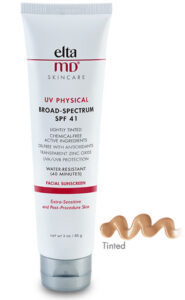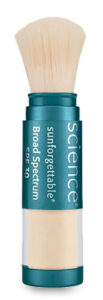
Using sunscreen every day reduces your risk of skin cancer, which is the most common type of cancer in the United States. Sunscreen also prevents sunburns, sunspots, and wrinkles. One in five Americans will develop skin cancer, so developing a regular habit of sunscreen use is very important to your long-term health. However, browsing the sunscreen aisle at your local pharmacy and trying to choose a product can be overwhelming. There are so many different brands, SPF levels, lotions, gels, sprays, and creams. What should you choose? There are actually a few key sunscreen requirements that can help you narrow down your selection.
What To Look For
First, you should choose a sunscreen that says broad spectrum. This means that it covers both UVA and UVB radiation, the types of rays responsible for causing skin cancer. In addition to causing skin cancer, UVA rays are mainly responsible for aging the skin, while UVB rays are most likely to cause a sunburn. If you do not use a broad spectrum sunscreen, you will not be protecting the skin from both types of rays.
 Next, you should select a sunscreen with an SPF of 30 or higher. SPF stands for Sun Protection Factor, and measures how much sun exposure the skin can withstand before burning. An SPF of 30 blocks about 97% of the sun’s rays. Sunscreens with higher SPF numbers do protect against a higher percentage of UV radiation, but it is only a slight amount and no sunscreen blocks 100% of the rays.
Next, you should select a sunscreen with an SPF of 30 or higher. SPF stands for Sun Protection Factor, and measures how much sun exposure the skin can withstand before burning. An SPF of 30 blocks about 97% of the sun’s rays. Sunscreens with higher SPF numbers do protect against a higher percentage of UV radiation, but it is only a slight amount and no sunscreen blocks 100% of the rays.
The sunscreen you pick should also be water resistant. Keep in mind that sunscreens are not water-proof, and are only tested to be water resistant up to 80 minutes during water activities or with a lot of sweating.
 There are several formulations of sunscreens that suit different areas of the body and different scenarios. Creams are best for the face or dry skin. Gels are good for hairy areas, like the chests, legs, and arms of men. Spray sunscreens can also be used, but users need to be cautious about inhaling it by never spraying it directly near the face. Furthermore, when you use a spray sunscreen, you need to make sure the skin is completely covered and rub the sunscreen around with your hand. Sunscreen also is available in a powder formulation that can be brushed on the skin like a cosmetic powder; it is especially useful when reapplying sunscreen over make-up. Sunscreen comes as a chapstick as well, and should be applied to the lips for protection. You may need a few different types of formulations to meet all your needs.
There are several formulations of sunscreens that suit different areas of the body and different scenarios. Creams are best for the face or dry skin. Gels are good for hairy areas, like the chests, legs, and arms of men. Spray sunscreens can also be used, but users need to be cautious about inhaling it by never spraying it directly near the face. Furthermore, when you use a spray sunscreen, you need to make sure the skin is completely covered and rub the sunscreen around with your hand. Sunscreen also is available in a powder formulation that can be brushed on the skin like a cosmetic powder; it is especially useful when reapplying sunscreen over make-up. Sunscreen comes as a chapstick as well, and should be applied to the lips for protection. You may need a few different types of formulations to meet all your needs.
Using Sunscreen the Right Way
Now that you have the right sunscreen, one that is broad spectrum, SPF 30 or higher, water resistant, and in a formulation that is right for your skin, you need to know how to apply it correctly to optimize sun protection.
Use enough sunscreen. An adult should use one ounce of sunscreen – about 4-5 tablespoons or one shot glass full – to cover the entire body that is exposed in a bathing suit.
Apply sunscreen 30 minutes before heading outdoors. There are two classes of sunscreens: chemical sunscreens such as oxybenzone and avobenzone, which absorb the UV radiation so it does not harm the skin, and physical blockers such as titanium dioxide and zinc oxide that reflect harmful UV rays. Chemical sunscreens require time on the skin in order to be effective so should be applied 30 minutes prior to sun exposure.
Reapply sunscreen. Under normal conditions, sunscreen must be applied every 2 hours to be effective. If swimming or sweating heavily, sunscreen should be applied every 80 minutes.
Special Consideration
Parents of infants and young children often ask if there is a sunscreen that is best for their children’s skin. Infants that are 6 months old or younger should avoid sun exposure all together. For children older than 6 months, there are several formulations advertised specifically for the younger population, but sunscreens containing zinc oxide and titanium dioxide are best for young, more sensitive skin.
In recent years, there has been internet and media buzz about whether or not sunscreen is truly safe. The most maligned ingredients, oxybenzone and retinyl palmitate, have been used for years in sunscreens and after rigorous testing were approved by the FDA. There is no data to support hormonal problems, cancer, or other health problems caused by sunscreen ingredients. Nanotechnology has also been targeted as a health risk. However, there is no data to prove it. Nanoparticles were developed to allow sunscreen to spread more easily without the thick, white texture, and are actually not able to penetrate deeper levels of skin. What is known is that sunscreen protects against sunburns, premature aging, and skin cancers, which include deadly melanomas.
Even with the optimal sunscreen use, not all sun damage can be prevented when engaging in outdoor activities. You should also protect your skin from harmful UV radiation by avoiding the sun from 10 a.m. until 3 p.m. when its rays are the harshest, wearing protective clothing like rash guard shirts, hats, and sunglasses, and seeking shade whenever possible. With a thorough application of a good sunscreen and other sun protection habits, you can still enjoy your favorite summer activities without the burn.
For more information contact Dermatology Associates.
